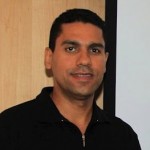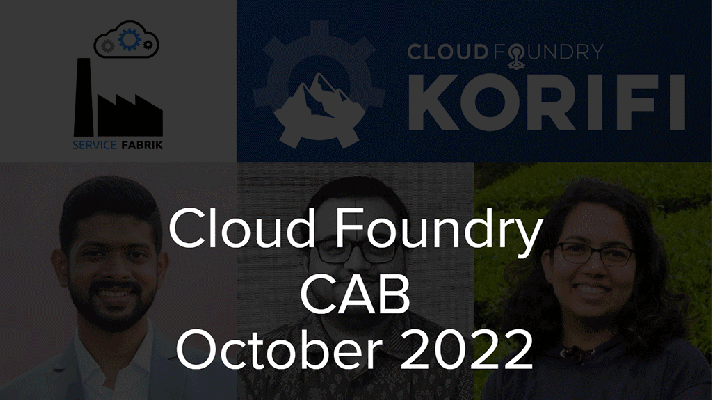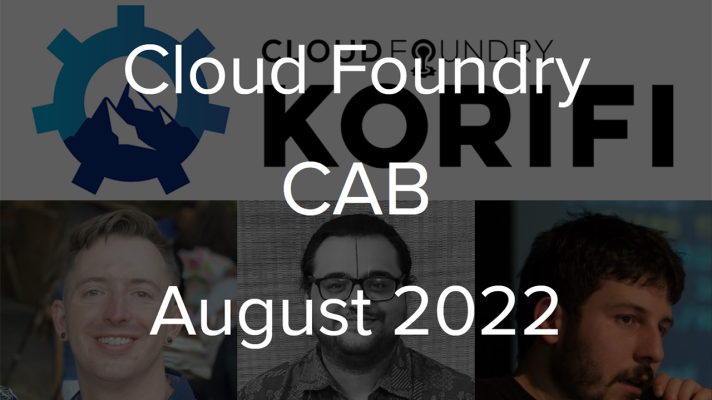Cloud Foundry Advisory Board Meeting, Dec 2018: Terraform and CF Dev
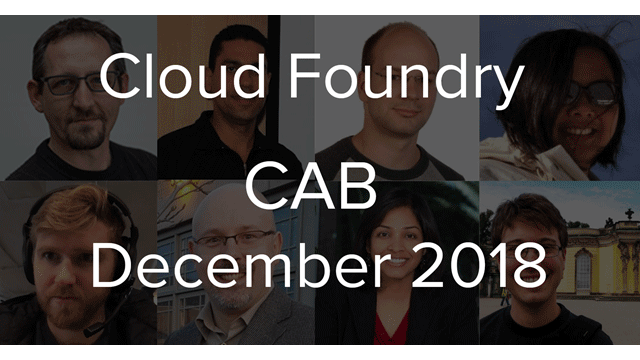
The final Cloud Foundry Community Advisory Board (CAB) meeting of 2018 featured two community projects—Cloud Foundry Terraform Provider and CF Dev. Members of the Cloud Foundry development teams also shared their monthly updates on the maintained ecosystem projects.
Cloud Foundry Terraform Provider
Janos Binder of SAP shared his team’s experience using Cloud Foundry Terraform Provider, a plugin that enables users to configure environments declaratively with HashiCorp Configuration Language (HCL).
In his example, Janos referenced the architecture used in the SAP Leonardo Machine Learning Foundation noting how it needed microservices across three different landscapes—Cloud Foundry, Kubernetes, and Amazon Web Services (AWS).
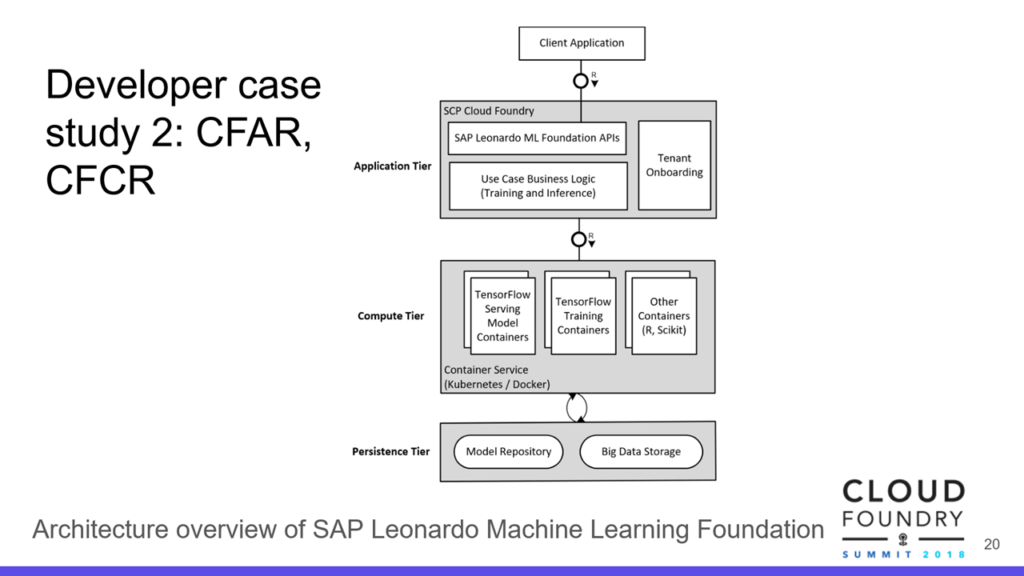 SAP Leonardo uses Cloud Foundry, Kubernetes, and AWS (Image credit)
SAP Leonardo uses Cloud Foundry, Kubernetes, and AWS (Image credit)“When we deploy our landscape, we have to deploy over Cloud Foundry, Kubernetes, and AWS. To support these three landscapes, we needed a tool, and Terraform was the tool that helped us with this issue.” —Janos Binder, SAP
During the call, he demoed how to deploy an application and how simple it is to modify the application with Terraform.
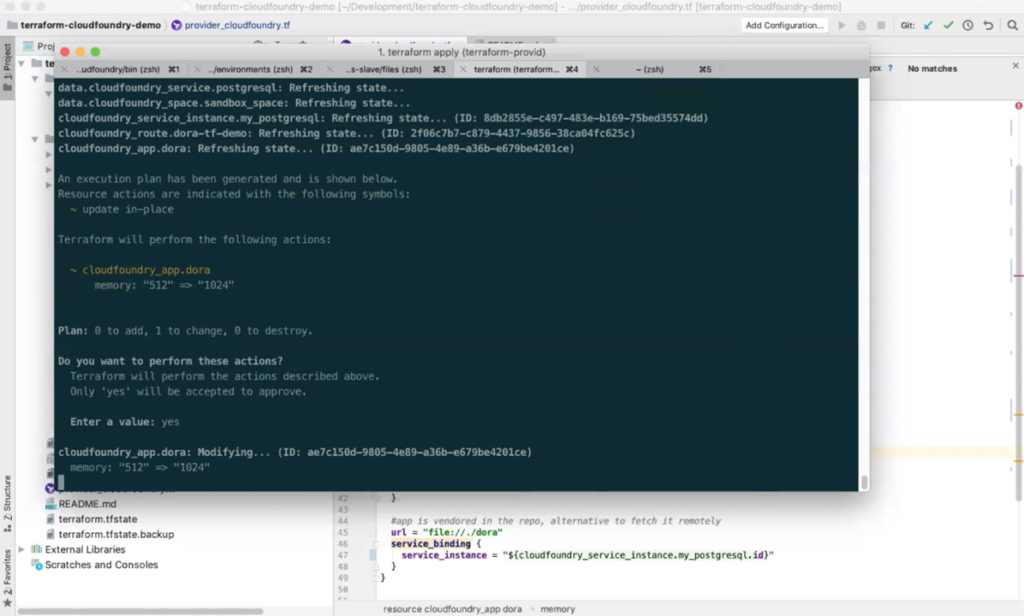 The application’s memory requirements changed from 512 MB to 1024 MB
The application’s memory requirements changed from 512 MB to 1024 MBCloud Foundry Terraform Provider’s GitHub repo
CF Dev
Samuel Dawson of Pivotal shared updates of CF Dev—a new distribution of Cloud Foundry that can run on local machines using native hypervisors and a fully functional BOSH Director.
“It’s like running Cloud Foundry in miniature on a local machine or a single machine. Some of the common use cases that we’ve been thinking about include debugging locally or spinning up a Cloud Foundry instance as a way to begin application development in a Cloud Foundry environment if the rest of the network is locked down.” —Samuel Dawson, Pivotal
Samuel emphasized that CF Dev has improved since the last demonstration during the March CAB call. These improvements include:
- Users can now employ a state disk (Windows, Mac).
- Minimum RAM requirement is now 5 GB.
- Start time is now under 30 minutes.
- Telemetry has been added.
- Insufficient memory warning has been added at the start.
He added that the CF Dev team is “continuing to test this in other machines to see how small we can make that footprint, and how quickly we can get CF Dev up and running locally.”
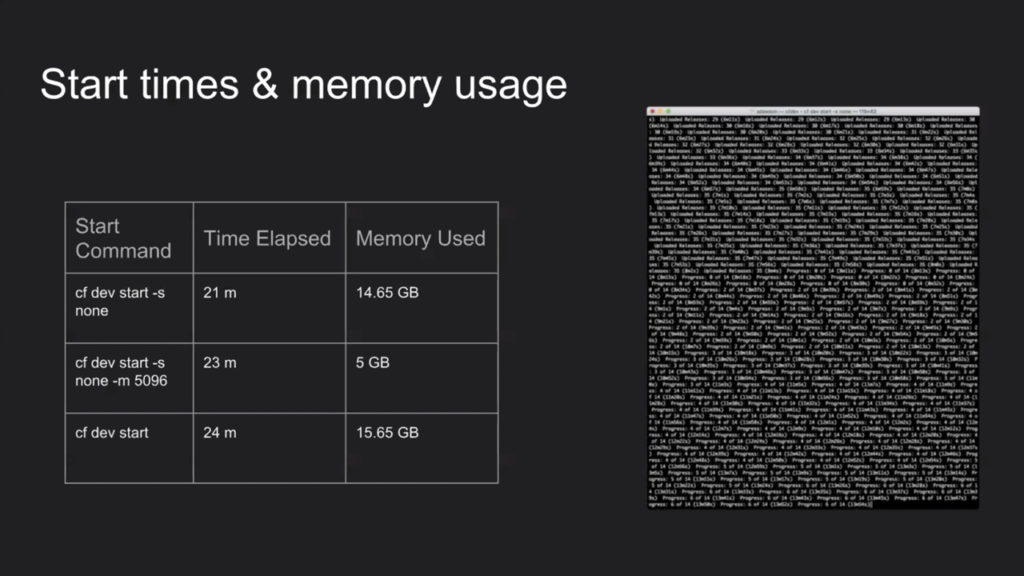 CF Dev start time and memory usage comparison
CF Dev start time and memory usage comparisonFinally, Samuel listed some of the features that are currently being planned:
- Linux support
- deploying and undeploying services while running CF Dev
- binding local volume services to applications
Runtime PMC
Eric Malm of Pivotal reported several runtime updates:
- The release integration team is preparing v7 of
cf-deploymentfor January. - The CAPI team is requesting beta feedback on zero-downtime deployments. They’re also finishing up adding labels and annotations in the Cloud Controller API.
- The routing team has scaled up to 20,000 routes for the adoption of Istio Pilot and Envoy as a gateway proxy.
- The container networking team is continuing work on dynamic egress rules as replacement for application security groups and transparent client-side load balancing via Envoy.
- CLI released v6.41.0 with stack assignment for buildpacks and internal domain creation.
- The Garden-Windows team is replacing the versioned “windows2016” stack with just “windows.”
- The Loggregator team is progressing with a new syslog agent.
- The Eirini team has passed an initial set of the core CF Acceptance Tests.
- The Persi team has added support for v1.0 of the Container Storage Interface.
- The Diego team is finishing up efforts to improve efficiency of the droplet setup.
BOSH
Frederic Desbiens of Pivotal noted that Marco Voelz of SAP had announced stepping down as BOSH Core Europe PM, but will remain as BOSH PMC lead. Frederic also mentioned that the BOSH vision and strategy document was made public to provide visibility and to foster collaboration in the community. Finally, he followed up with a few more BOSH updates:
- The Toronto team is working on implementing rotations for manifest-defined certificates.
- Drain life cycle improvements are in the planning stage.
- The San Francisco team is making improvements to DNS healthiness. The team has also implemented security improvements where credentials will no longer be written to a disk (credentials are written in a temporary file system instead).
CF Extentions
Michael Maximilien of IBM (aka Dr. Max), who moderated the call, listed a few developments:
- Stratos v2.2.0 was released.
- The SAP MultiApps team added support for parallel applications and services, as well as for asynchronous OSB API.
- Node.js buildpacks moved to v3.
CF Extensions’ GitHub repo | Stratos’ GitHub repo
Cloud Foundry Foundation updates
Swarna Podila of the Cloud Foundry Foundation reminded callers that the next Cloud Foundry Summit will be held in Philadelphia on April 2–4. The full schedule of the summit will be announced mid-January. Registrations are still open, and a registration code for contributors has been sent to the cf-dev mailing list.
She also commented on the success of the most recent Cloud Foundry Day, which was held in Seattle on December 10. Lastly, the CF Foundation will undergo its annual shutdown starting December 22 until January 6.
To cap off the year, Chip Childers of the Cloud Foundry Foundation gave thanks to all the members of the CF community.
“It’s been an amazing year. We’ve had the opportunity to talk to a lot of the customers, different distribution providers, as well as other open-source users. It’s really amazing to hear all the great feedback about all kinds of different use cases from the developer experience to the application runtime.” —Chip Childers, CF Foundation
As for 2019, Chip noted that the Cloud Foundry Foundation will continue activity around embracing open-source projects throughout the broader ecosystem.
See you next year!
Before the call ended, Dr. Max mentioned that the next CAB call is scheduled for Wednesday, January 16. As usual, the call will start at 8 a.m. Pacific Time. Anyone interested can join the Cloud Foundry’s CAB Slack channel.






